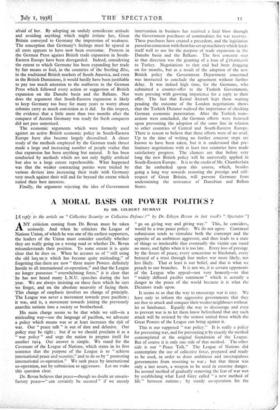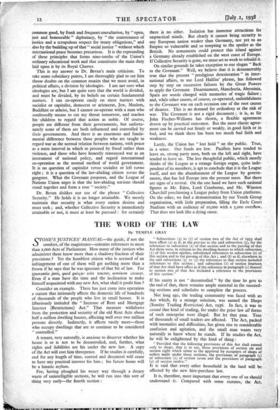A MORAL BASIS OR POWER POLITICS ?
By DR. GILBERT MURRAY
[A reply to the article on " Collective Security or Collective Defence?" by Dr. Edwyn Bevan in last week's " Spectator "J ANY criticism coming from Dr. Bevan must be taken seriously. And when he criticises the League of Nations Union, of which he was one of the earliest supporters, the leaders of the Union must consider carefully whether they are really going on a wrong road or whether Dr. Bevan misunderstands their position. To some extent it is quite dear that he does so. When he accuses us of " still using the old laniuue which has become quite misleading," of forgetting that there are now " three major Powers definitely hostile to all international co-operation," and that the League no longer possesses " overwhelming force," it is clear that he has not heard many L.N.U. speeches during the last year. We are always insisting on these facts which he says we forget, and on the absolute necessity of facing them. 'This change of emphasis involves no change of principle. The League was never a movement towards pure pacifism ; it was, and is, a movement towards joining the previously anarchic nations into a society or brotherhood.
His main charge seems to be that while we still—in a misleading way—use the language of pacifism, we advocate a policy which means war or at least increases the risk of war. Our " peace talk " is out of date and delusive. Our policy may be right ; but if so we should proclaim it as a " war policy " and urge the nation to prepare itself for another 1914. Our answer is simple. We stand for the Covenant of the League of Nations, which states in its first sentence that the purpose of- the League is to " achieve international peace and security," and to do so by " promoting international co-operation!' We seek peace by international co-operation, not by submission to aggressors. Let me make this question clear.
Dr. Bevan believes that peace—though no doubt an unsatis- factory peace—" can certainly be secured " if we merely " go on giving way and giving way." This, he considers, would be a true peace policy. We do not agree. Continual submission tends to stimulate both the contempt and the appetite of an ambitious aggressor, and thus leads to a state of things so intolerable that eventually the victim can stand no more, and fights when it is too late. Every loss of prestige by the forces of peace, every concession to blackmail, every betrayal of a trust through fear makes war more likely, not less likely. That at least is our belief, and that is what we preach to our branches. It is not we, it is certain opponents of the League who appeal—not very honestly—to that " widely diffused pacifist sentiment " which is actually a danger to the peace of the world because it is what the Dictators trade upon.
It seems to us that the way to encourage war is easy. We have only to inform the aggressive governments that they are free to attack and conquer their weaker neighbours without let or hindrance. Equally the way to discourage and even to prevent war is to let them know beforehand that any such attack will be resisted by the utmost united force which the Great Powers of the League can bring against it.
This is our supposed " war policy." It is really a policy for preventing war, and for preventing it by exactly the method contemplated at the original foundation of the League. But of course it is only one side of that method. The other side is our " Peace Talk." The League of Nations did contemplate the use of collective force, prepared and ready to be used, in order to deter ambitious and unscrupulous governments from resorting to war ; but that threat was only a last resort, a weapon to be used in extreme danger. Its normal method of gradually removing the fear of war was by establishing what Lord Grey called " a new method of life " between nations ; by steady co-operation for the common good, by frank and frequent consultation, by " open, just and honourable " diplomacy, by " the maintenance of justice and a scrupulous respect for treaty obligations," and also by the -building up of that " social justice " without which international peace becomes precarious. It is the expounding of these principles that forms nine-tenths of the Union's ordinary educational work and that constitutes the main duty laid upon it by its Royal Charter.
This is my answer to Dr. Bevan's main criticism. To take some subsidiary points, I am thoroughly glad to see him throw doubts on the common maxim that we must avoid, in political affairs, a division by ideologies. I am not sure what ideologies are, but I am quite sure that the world is divided, and must be divided, by its beliefs on certain fundamental matters. I can co-operate easily on most matters with socialist or capitalist, democrat or aristocrat, Jew, Moslem, Buddhist or atheist, but I cannot co-operate with a man who confessedly means to cut my throat tomorrow, and teaches his children to regard that action as noble. Of course, people are different from their governments, but unfortu- nately some of them are both influenced and controlled by their governments. And there is an enormous and funda- mental difference between those peoples who are taught to regard war as the normal relation between nations, with peace as a mere interval in which to proceed by fraud rather than violence, and those who have honestly renounced war as an instrument of national policy, and regard international co-operation as the normal method of world government. It is no question of capitalist versus socialist or left versus right ; it is a question of the law-abiding citizen versus the gangster. What the Covenant proposes, and the League of Nations Union urges is that the law-abiding nations should stand together and form a true " society."
Dr. Bevan dislikes our use of the phrase " Collective Security." He holds it is no longer attainable. We merely maintain that security is what every nation desires and must seek ; and, whether Collective Security is immediately attainable or not, it must at least be pursued : for certainly there is no other. Isolation has immense attractions for unpractical minds. But clearly it cannot bring security to any European nation weaker than Germany, nor yet to an Empire so- vulnerable and so tempting to the spoiler as the British. No armaments could protect this island against a Germany already established on the west coast of Europe. If Collective Security is gone, we must set to work to rebuild it. On similar grounds he takes exception to our slogan " Back to the Covenant." Well, we believe that it is demonstrably true that the present " prodigious deterioration " in inter- national affairs, to use Lord Halifax' phrase, has followed step by step on successive failures by the Great Powers to apply the Covenant. Disarmament, Manchuria, Abyssinia, Spain are words charged with memories of tragic failure and, while other causes, of course, co-operated, unfaithfulness to the Covenant was on each occasion one of the root causes of disaster. This is no demand for orthodoxy at the risk of war. The Covenant is not a rigid document ; it is, as Sir John Fischer-Williams has shown, a flexible agreement drawn up by practical statesmen. But the most elastic agree- ment can be carried out firmly or weakly, in.good faith or in bad, and we think there has been too much bad faith and weakness.
Lastly, the Union has " lost hold " on the public. True, in a sense. Our funds are low. Pacifists have tended to leave us, strong party men, both on the left and right, have tended to leave us. The less thoughtful public, which mostly thinks of the League as a strange foreign organ, quite inde- pendent of its members, is apt to conclude that it is the League itself, and not the abandonment of the League by govern- ments, that has led Europe into the present mess. But there are signs of a revival. On the one hand we have such national figures as Mr. Eden, Lord Cranborne, and Mr. Winston Churchill proclaiming a League policy from Union platforms. On the other, we find a demonstration by our Youth Group organisation, with little preparation, filling the Earls Court Stadium with an audience of to,000 with a 5,00o overflow. That does not look like a dying cause.



















































 Previous page
Previous page